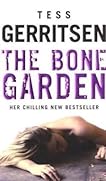 The Bone Garden by Tess Gerritsen
The Bone Garden by Tess GerritsenMy rating: 2 of 5 stars
I quite like books that have a mystery in the past that has repercussions in the present; Robert Goddard is probably one of the better-known current exponents of that genre. This one is Tess Gerritsen's attempt to write a novel like that, where a recently-divoced woman, Julia Hamill, buys an old house, and finds a skeleton buried in the garden.
The previous occupant of the house had died, leaving a great accumulation of papers, and, instead of tossing them out, her relatives had passed them on to another member of the family who became interested in piecing together the family history, going back to Boston in the 1830s, where a hospital is suffering from an epidemic of child-bed fever and serial murders.
Tess Gerritsen, the blurb tells us, is a medical doctor and so familiar with the autopsies and emergency rooms she describes in her novels, particularly those featuring her usual protagonist Dr Maura Isles, who makes a cameo appearance in this one. But therein lies an anachronism, or at least what feels to me to be an anachronism. At least in the beginning, I found myself wondering if nurses were really as professional as they are portrayed in the book back in the 1830s? And did hospitals really have "emergency rooms" back in those days, and would people be tossing around modern buzzwords like "modalities"?
Obviously Tess Gerritsen has done some research into her subject -- to the extent of giving one of her minor villains, a resurrectionist, the name of Burke, which immediately calls to mind the real life (or should that rather be "real death"?) activities of the notorious Burke & Hare.
It improved a bit as it went on, and I found myself at least interested enough to want to see what happened at the end, but Robert Goddard she isn't. So two stars then. I've read plenty of worse books, but also plenty of better ones.
View all my reviews >>
1 comment:
I found myself wondering if nurses were really as professional as they are portrayed in the book back in the 1830s?
Yes, retrospect can be an inaccurate luxury.
Post a Comment